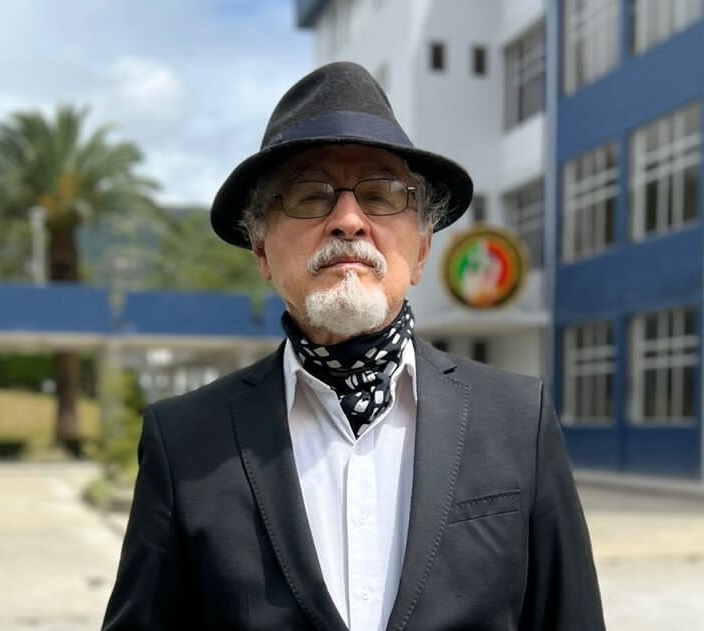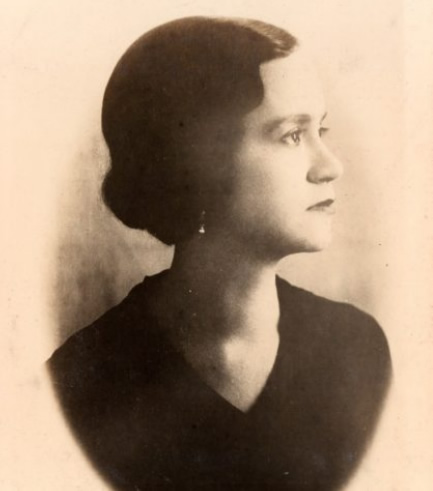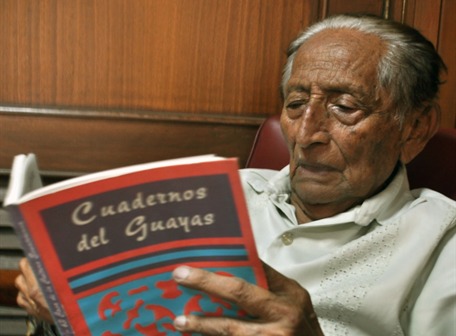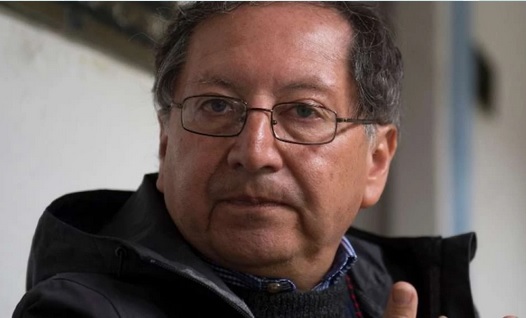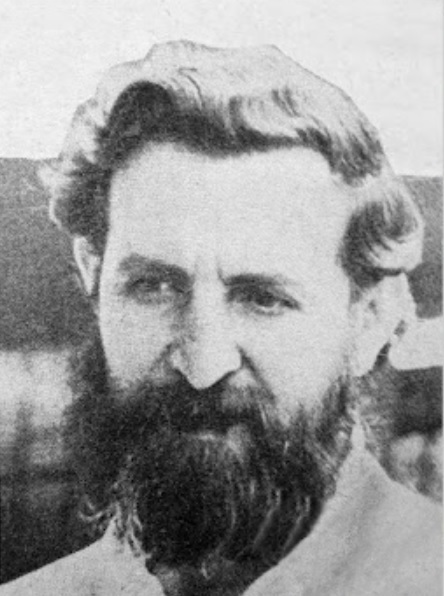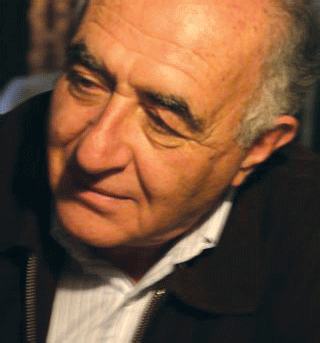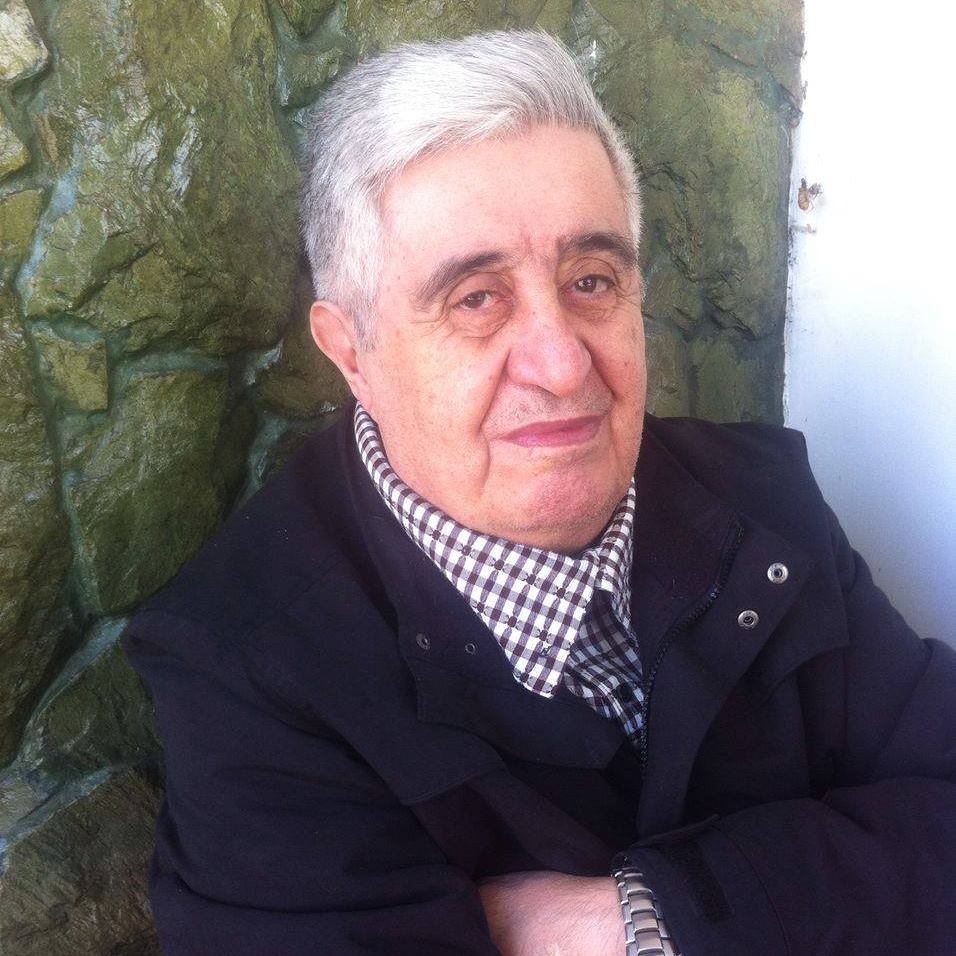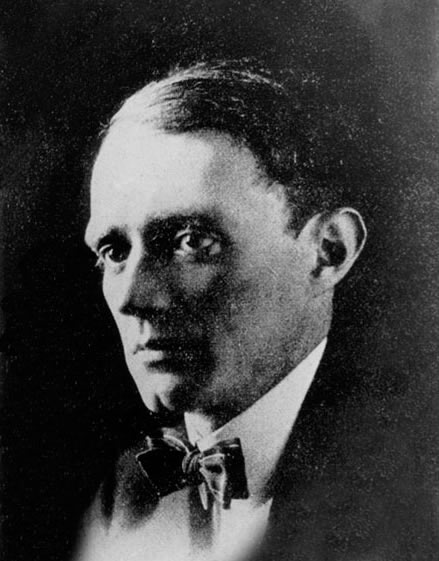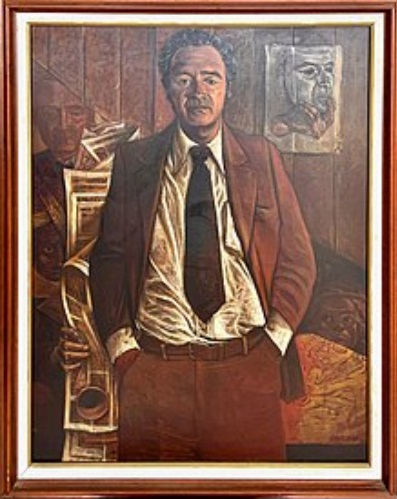Carlos Alfonso Carrión Figueroa (Malacatos, Loja, January 25, 1944) is an Ecuadorian novelist and short story writer. He has won several prestigious literary awards, including the José de la Cuadra Award for his 1982 short story collection “El más hermoso animal nocturno” [The Most Beautiful Nocturnal Animal], the Joaquín Gallegos Lara Award twice, first for his 1995 short story book “El corazón es un animal en celo” [The Heart is an Animal in Heat] and later for his 2005 novel “¿Quién me ayuda a matar a mi mujer?” [Who’ll Help Me Kill My Wife?], which also earned him the “Lira y la Pluma” Award. Additionally, his work has been featured in various anthologies. In 2013, he won the Miguel Riofrío Award for his novel “La mantis religiosa” [The Praying Mantis]. Recently, in 2022, Carrión was honored with the Eugenio Espejo National Prize, the highest literary recognition in Ecuador.
Continue reading “Carlos Carrión”Category: 20th Century Writers
Matilde Hidalgo de Prócel
Matilde Hidalgo de Prócel (Loja, September 29, 1889 – Guayaquil, February 20, 1974) was an Ecuadorian physician, poet, and activist who was a pioneer for women’s rights in Ecuador and Latin America, becoming the first woman to vote in the country and the continent in 1924. As a doctor, she also became the first woman to earn a Doctorate in Medicine in Ecuador, using her platform to fight for women’s rights and improve healthcare for women and children. She was an active member of feminist organizations and expressed her views through poetry. Her legacy as one of the most important women in Ecuadorian history endures, inspiring future generations to fight for gender equality. Matilde Hidalgo was honored by Google on November 21, 2019, with a Google Doodle commemorating what would have been her 130th birthday.
Continue reading “Matilde Hidalgo de Prócel”Bertha Cando de Izurieta
Bertha Cando de Izurieta, also known as Bertha de Izurieta, was an exceptional Ecuadorian writer and journalist hailing from Cotopaxi. She broke barriers as the founding director of Cotopaxi Province’s very first newspaper, El Cotopaxi, which graced readers’ hands from July 24, 1959, until February 22, 1960. In 1962, she became Ecuador’s first-ever female President of a Municipal Council in the town of Saquisilí located in the Cotopaxi Province. Her husband, Gustavo Izurieta Obando, was the deputy director and proprietor of the publishing house, “Editorial Minerva.” Their son, Gustavo Izurieta, also took the reins as director for a few months. In 1954, Bertha’s novel, “Juventud inmolada” [Immolated Youth], was released under the banner of their publishing house.
Continue reading “Bertha Cando de Izurieta”Cristóbal Garcés Larrea
Cristóbal Garcés Larrea (Guayaquil, April 20, 1924 – May 2017) was an Ecuadorian poet, editor, and literary critic. He was the editor-in-chief of Cuadernos del Guayas, the official magazine of the Guayas chapter of the House of Ecuadorian Culture, which was created by Carlos Zevallos Menéndez and whose prior editors-in-chief were Adalberto Ortiz and Francisco Pérez Febres Cordero (albeit for short periods). In 1944, he and Galo René Pérez, Jorge Enrique Adoum and Enrique Noboa Elizaga published the literary magazine Madrugada. In 1970, he released a book series that included stories by then-contemporary writers from certain Latin American countries or regions (which he compiled and edited), including: “Narradores Centroamericanos Contemporáneos,” “Narradores Cubanos Contemporáneos,” “Narradores Colombianos Contemporáneos,” and “Narradores Brasileños Contemporáneos.” He published several of his poems in magazines in Ecuador but a collection of his poems has never been published as a book. He worked for many years as a professor.
Continue reading “Cristóbal Garcés Larrea”Diego Velasco Andrade
Diego Velasco Andrade (Quito, 1958) is an Ecuadorian poet, fiction writer, editor, professional architect, and university professor. In 1982, he joined Miguel Donoso Pareja’s Literary Workshop at the House of Ecuadorian Culture. He has published a number of poetry collections and fiction books. Since the 1980s, he has been a professor of Semiotics and Design at the Central University of Ecuador. His 2002 novel “¿El poeta ha muerto?” [Is the Poet Dead?] was adapted for the stage by the Ecuadorian group Ojo de Agua and staged in Ecuador, Spain and Belgium. In the 1980’s he was a founding member of a literary group called El Matapiojo. For many years, starting in 2005, he directed the literary workshops of the House of Ecuadorian Culture. His works have appeared in several Ecuadorian literary anthologies.
Continue reading “Diego Velasco Andrade”Michael H. Handelsman
Michael H. Handelsman (Weehawken, New Jersey, United States, May 11, 1948) is an American university professor, scholar, literary critic, and writer. He is professor emeritus of Latin American literature at the University of Tennessee, Knoxville, where he has been teaching since 1976. He has directed the university’s Latin American Studies and Global Studies programs. His principal area of specialization is Ecuadorian literature and culture. Some of his books include: “Amazonas y artistas: Un estudio de la prosa de la mujer Ecuatoriana” (1978), “Lo afro y la plurinacionalidad: el caso ecuatoriano visto desde su literatura” (1999), and “Leyendo la globalización desde la mitad del mundo: identidad y resistencias en el Ecuador” (2005) which received the Isabel Tobar Guarderas award in Quito and the A.B. Thomas award in the U.S. He’s also written extensively on Benjamín Carrión, including: “En torno al verdadero Benjamín Carrión” (1989), “El ideario de Benjamín Carrión” (1992) and “Benjamín Carrión: el pensamiento fundamental” (2007). He’s been a visiting professor at the University of Kentucky, the Catholic University of Santiago de Guayaquil (UCSG), and the Simon Bolivar Andean University of Quito. Since November 12, 2012, he’s been a foreign corresponding member of Ecuador’s National Academy of Language.
Continue reading “Michael H. Handelsman”Francisco Delcasty
Francisco Delcasty was a revolutionary Ecuadorian poet and member of the Communist Party of Ecuador. He authored his most famous poem a day after the National Army massacred over a thousand striking workers during the Guayaquil general strike of 1922, which starts with the line “El hambre va en desfile” [Hunger is marching]. In 1970, the House of Ecuadorian Culture published a collection of his poems entitled, “Alpha y omega: apoesía.” The renowned Guayaquilean poet Sergio Román Armendáriz dedicated a poem to him entitled, “Puerto Rico en el Llanto” in the book “Club 7” (1954). Román was friends with Delcasty during the 1950’s and said in an interview that he believed Delcasty was likely a Spaniard (born with the last name Castillo) who was considered Ecuadorian because of his close ties to Ecuador and its politics.
Continue reading “Francisco Delcasty”Rafael Larrea Insuasti
Rafael Larrea Insuasti (Quito, 1942 – Ibidem, April 22, 1995) was an Ecuadorian poet, journalist, political essayist, editor, songwriter, music composer, and social activist. He is known as a social and revolutionary poet who was a member of the Central Committee of the Marxist-Leninist Communist Party of Ecuador (PCMLE). For over 20 years, he was the editor-in-chief of the Party’s newspaper, En Marcha, and created the PCMLE’s first propaganda manual. In the 1960s, along with other young leftist poets, he founded the Tzántico group. His poetry books include “Levantapolvos” (1969), “Nuestra es la vida” (1978), “Campanas de bronce” (1983), “Bajo el sombrero del poeta” (1988), “Nosotros, la luna, los caballos” (1995), and “La casa de los siete patios” (1996, published posthumously). In addition to political activity, Larrea graduated as a journalist from the School of Information Sciences of the Central University of Ecuador and was a language teacher. His political, cultural, and literary writings were collected in a book entitled, “Escritos polticos” (2007), published by the PCMLE Commission for Art and Culture. He also penned a number of popular songs, such as “Capishca de la Libertad,” “La Negra Clara Inés,” and others. A public basic education school in Duran, Ecuador, bears his name.
Continue reading “Rafael Larrea Insuasti”Modesto Ponce Maldonado
Modesto Ponce Maldonado (Quito, 1938) is an Ecuadorian novelist, short story writer, and businessman. He began writing fiction in his later years. At the age of 60, he published his first collection of short stories, “También las arcillas” (1997), which was followed by a novel, “El palacio del diablo” [The Devil’s Palace] (2005), which won the Joaquín Gallegos Lara Prize for best novel of the year. The novel’s title was taken from the name of a brothel that formerly stood in colonial Quito’s La Ronda neighborhood. Using the pen name Sergio Lozada, his second novel, “La casa del desván,” was shortlisted for the prestigious Premio Iberoamericano Planeta-Casa de América de Narrativa award. The novel, released by Editorial Planeta in 2008, is a first-person account of a schizophrenic man’s thoughts while he is institutionalized for his condition. In 2017, his novel “Adela” received honorable mention at the La Linares Short Novel Award. Ponce has also contributed to various literary magazines, including El Búho, Eskeletra, Kipus and Letras del Ecuador.
Continue reading “Modesto Ponce Maldonado”Alberto Ordoñez Ortíz
Alberto Ordoñez Ortíz (Cuenca, March 16, 1942 – Ibidem, August 29, 2022) was an Ecuadorian poet, writer, and lawyer. During the last years of his life he worked as an opinion columnist for the daily El Mercurio of Cuenca. From 1962 – 2004 he published at least 10 poetry books. As a poet, he won various awards, including First Prize in the 1963 National Poetry Contest sponsored by the State University of Cuenca, Second Prize in the 1978 Ismael Pérez Pazmiño Poetry Contest for Perfil del hombre y su desvelo, and the First Prizes in the 1992 Poetry Contests promoted by the Ecuadorian Social Security Institute of Ecuador. In 2003, the Municipality of Cuenca awarded him the “Fray Vicente Solano” Award, an award given to the best poet of the year in Cuenca, and in that same year, the National Congress of Ecuador awarded him the “Vicente Rocafuerte” Prize, in recognition of his literary work and contribution to Ecuadorian poetry.
Continue reading “Alberto Ordoñez Ortíz”Eduardo Muñoz Valdebenito
Eduardo Muñoz Valdebenito was an Ecuadorian poet who in 1977 won 3rd Prize in the Ismael Pérez Pazmiño Poetry Contest of the newspaper El Universo for his poem “La intimidad.” His prize-winning poem was published in “Poesía ecuatoriana del siglo XX” (Casa de la Cultura Ecuatoriana, 1979).
Continue reading “Eduardo Muñoz Valdebenito”Bernard Fougères
Bernard Fougères, born Bernard Victor Theophile Isidore Fougères Julliot (France, 1934 – Guayaquil, May 5, 2018) was a French journalist, poet, and TV host who resided in Ecuador since May 1, 1965. His poem “Guayaquil de mil hojas” [Guayaquil of a thousand pages] won the 2nd Prize of the 1977 Ismael Pérez Pazmiño Poetry Contest. His winning poem was published in the anthology “Poesía ecuatoriana del siglo XX: Años 1976, 1977, 1978” (Casa de la Cultura Ecuatoriana, Núcleo del Guayas, 1976). He worked as a TV personality for more than 50 years in shows such as El Show de Bernard and Bernard en la noche.
Continue reading “Bernard Fougères”Gonzalo Portugal Proaño
Gonzalo Portugal Proaño (19??-????) was an Ecuadorian poet. In the 1970’s his poems appeared in a few poetry anthologies published by the House of Ecuadorian Culture. In 1976 he won 3rd Prize in the Ismael Pérez Pazmiño Poetry Contest for his poem “Escorzo del perfecto desterrado.” His prize-winning poem was published in “Poesía ecuatoriana del siglo XX” (Casa de la Cultura, Núcleo del Guayas, 1979).
Continue reading “Gonzalo Portugal Proaño”Remigio Romero y Cordero
Remigio Romero y Cordero (Cuenca, June 13, 1895 – Quito, 1967) was an Ecuadorian poet, lawyer, professor, parliamentarian and journalist. He was the son of the poets Remigio Romero León and Aurelia Cordero Dávila. After graduating from high school at Benigno Malo National School, he enrolled in the Faculty of Jurisprudence at the University of Cuenca, where he went on to earn the degrees of Doctor of Jurisprudence and Lawyer of Ecuador’s Courts of Justice. He grew up and received his initial education under the protection of the political and social reforms brought about by the Liberal Revolution. He earned significant acclaim due to his brilliant poetry, which gained him the honor of being crowned poet at the Quito Poetry Festival in 1933.
Continue reading “Remigio Romero y Cordero”Carlos Villasís Endara
Carlos Alfonso Villasís Endara (Bahía de Caráquez, November 17, 1930 – Quito, January 27, 2023) was an Ecuadorian writer, poet, playwright, and renowned art critic. He was the founder of the literary group “Galaxia,” member of the “Caminos” group, vice president of the Cotopaxi chapter of the House of Ecuadorian Culture, member of the Legal-Literary Society, and an honorary member of the Association of Plastic Artists of Ecuador. He was known by his family and friends as “Carlucho.”
Continue reading “Carlos Villasís Endara”